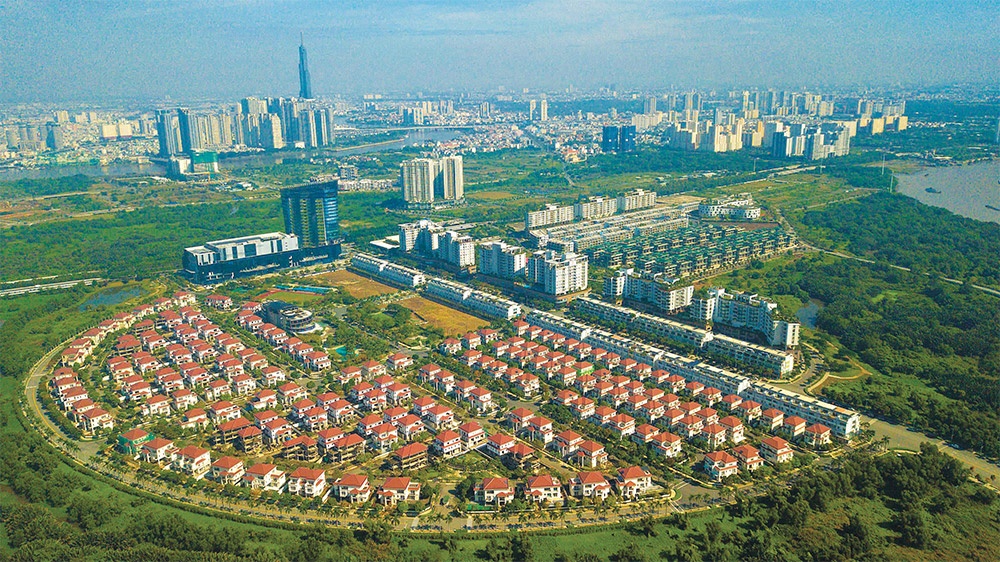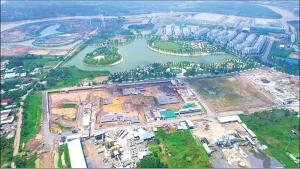Land hike shock deemed necessary
On August 28, Nguyen Toan Thang, director of Ho Chi Minh City Department of Natural Resources and Environment, confirmed that according to the draft, land prices in many areas of the city are expected to increase by up to 50 times.
 |
| Land price adjustments reflect the government’s efforts to build a more transparent environment, photo Le Toan |
The new land price list is expected to be implemented from the beginning of October to the end of the year. After that, the list will be reviewed again, to be applied for 2025. After that, the list will be adjusted every year under the force of the revised Land Law 2024.
However, Thang noted that these prices would still only reflect about 70 per cent of the market value.
“The new land valuation will help prevent real estate brokers from purchasing land at low prices and then inflating them to make large profits. This will protect home buyers’ rights and create a more transparent market, driving sustainable development in the real estate sector,” Thang said.
Le Thi Binh, a resident of Cu Chi district on the outskirts of Ho Chi Minh City, expressed concern that the draft price list will increase land prices by an average of 5-10 fold. In some suburban and peripheral areas, prices are expected to rise by as much as 50 times, creating significant pressure on those with agricultural land.
“I own more than five hectares of long-term cropland in Cu Chi district. If the new land price list is applied, I will have to spend billions to transfer it to residential land,” Binh said.
Similarly concerned, Nguyen Minh in Binh Chanh district said he is currently in the process of transferring his land to residential use.
“I haven’t yet calculated the total taxes and fees I’ll have to pay under the new price, but I’m afraid it will be too much, and I won’t be able to handle it,” Minh said.
Nguyen Minh Hoa from Go Vap district is also anxious as she plans to buy an apartment for VND4 billion ($166,000) after years of saving and borrowing from the bank. However, the seller has decided to halt the sale, anticipating that the apartment price will rise significantly if the new land price list is applied.
“Finding an apartment for our three-generational family has been difficult enough. Now, our dream of owning a home feels even further away, and we don’t know when we will be able to achieve it,” she said.
According to lawyer Le Thu Thao from the Ho Chi Minh City Bar Association, the adjustment of the land price list is not only a significant policy change but also reflects the government’s effort to create a more sustainable investment and development environment.
“Despite differing opinions and objections from the community, it is crucial that the implementation of this policy is carried out transparently and with adequate preparation to ensure the rights and stability of all parties involved,” Thao said.
She emphasised that implementing a major policy like the new land price list, which has such a profound impact on people, must be carried out with clear communication to avoid unnecessary confusion.
“The authorities need to study the land price increases with a clear roadmap, divided into multiple stages, to reduce the shock for businesses and residents, especially in outskirts districts where land conversion procedures are more volatile, and livelihoods remain challenging,” Thao said.
Ho Chi Minh City People’s Committee is currently considering issuing the new land price list in accordance with the provisions of the 2024 Land Law. The land price list has undergone drafting, public consultation, and review conferences. Once all opinions have been considered and revisions made, it will be submitted to the committee for approval.
 | Ensuring land prices on market principles The removal of the land price framework is seen as a step forward to help determine land prices close to the market and facilitate the work of compensation for site clearance and limit land speculation. |
 | Land price framework removal can aid infrastructure At the end of August, Ho Chi Minh City People’s Committee issued a new regulation on the land price adjustment coefficient (so-called K index) which is assessed closely to the reality of the current real estate market. Besides that, the content of removing the land price framework is also being proposed in the draft amended Land Law. |
 | Strict evaluation can ensure land law implementation To ensure the 2024 Land Law be implemented smoothly, it is necessary to carefully review, analyse, and evaluate the contents of draft decrees detailing some articles on implementation and on land prices. |
 | Land price framework remains inefficient Adjusting a land price framework according to the market is necessary, but a number of points could be considered before approval and application, according to experts who contributed to the draft of the adjusted price for the new land law. |
What the stars mean:
★ Poor ★ ★ Promising ★★★ Good ★★★★ Very good ★★★★★ Exceptional
Related Contents
Latest News
More News
- Construction firms poised for growth on public investment and capital market support (February 11, 2026 | 11:38)
- Mitsubishi acquires Thuan An 1 residential development from PDR (February 09, 2026 | 08:00)
- Frasers Property and GELEX Infrastructure propose new joint venture (February 07, 2026 | 15:00)
- Sun Group led consortium selected as investor for new urban area (February 06, 2026 | 15:20)
- Vietnam breaks into Top 10 countries and regions for LEED outside the US (February 05, 2026 | 17:56)
- Fairmont opens first Vietnam property in Hanoi (February 04, 2026 | 16:09)
- Real estate investment trusts pivotal for long-term success (February 02, 2026 | 11:09)
- Dong Nai experiences shifting expectations and new industrial cycle (January 28, 2026 | 09:00)
- An Phat 5 Industrial Park targets ESG-driven investors in Hai Phong (January 26, 2026 | 08:30)
- Decree opens incentives for green urban development (January 24, 2026 | 11:18)

 Tag:
Tag:




















 Mobile Version
Mobile Version